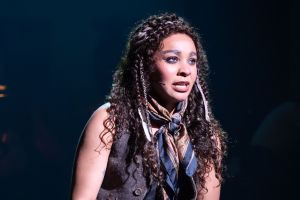The Land of the Living with Juliet Stevenson at the National Theatre – review
Stephen Daldry’s production of the new play by David Lan runs in the Dorfman until 1 November

David Lan’s humane presence has been missed in British theatre since he retired from running the Young Vic in 2018. His sympathies are always on the side of the dispossessed and the displaced, of people trying to do the right thing as the waves of history make nonsense of their efforts.
His new play, The Land of the Living, is a characteristically sober and reflective examination of a shocking series of true events, a reminder that the lessons of the past go unheeded in the present. Set in the aftermath of the Second World War, it centres on Himmler’s Lebensborn programme – a plan that attempted to create a pure Aryan race by kidnapping “perfect” children from other nations such as Poland and Ukraine and letting them be adopted by Nazi families.
The story he weaves around these facts – based on conversations with journalist Gitta Serreny – begins when Thomas, a traumatised young man, bursts into the London flat of a writer named Ruth (Juliet Stevenson) and demands to know why she did what she did 40 years before. Slowly, reluctantly, she begins to unravel the tangled tale. Ruth had been a young, idealistic worker for the United Nations Relief and Rehabilitation Administration, attempting to care for lost children when she and her colleagues accidentally uncover the scheme and become obsessed with trying to reunite the children with their original parents.
Stephen Daldry’s direction is devastatingly vivid, filling the small space of the Dorfman with an entire world of action and activity, letting still moments breathe. Miriam Buether has covered the long stage, with the audience packed around three sides, with a yellowing map of Europe, contested as the Allied powers seek to impose order and carve out influence. Box files are packed under the platform, and a forest fills one balcony. There’s a kitchenette at one end, bookshelves and a piano at the other.
Older Thomas (a pained and distant Tom Wlaschiha) looks on as his younger self, in an astounding first night performance from Artie Wilkinson-Hunt, bursts onto the stage, hurling plates, throwing sticks, smashing chairs, his physical anger a representation of the inarticulate hurt he feels as he is snatched from his German “parents” and placed under Ruth’s care.

The play is morally complex, asking difficult questions about parentship, guardianship and belonging. In being moved from pillar to post, from place to place, from adult to adult, Thomas’s sense of loss and alienation has never been assuaged. “I’m just some Kraut kid you pulled up by the roots and found not to your taste, so you threw him back,” he says, bitterly.
Stevenson, with febrile intensity and great sensitivity, grapples with the dilemmas raised, and with Ruth’s own sense of feeling that she must do something to right a terrible wrong, and her inability to examine the feelings that she has for the children under her wing – particularly Thomas.
The play conjures both the big events surrounding her actions – wonderfully conjuring a train taking some children back to Poland, with the help of benches and blankets – and the small ones, in a confrontation with her mother (sharply evoked by a beady Caroline Loncq) who “is always right about everything.” In an energetic cast playing many parts, there are lovely cameos too from Kate Duchene as the perpetually harassed Salvation Army volunteer and from Cosima Shaw in a brief moment as Thomas’s adoptive mother.
Under Daldry’s careful hand, the action is always moving on. But the direction cannot disguise the fact that the play is too long, circling back on its arguments, and becoming over-extended and flat in the process. Yet it never loses its relevance. The children – apart from Thomas – are never seen, but we hear their voices in Gareth Fry’s superb sound score. The echoes ring down the years to the voices of children in Ukraine and Gaza today. It’s a sound worth remembering.















